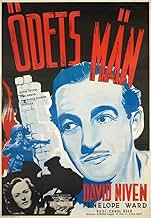CALIFICACIÓN DE IMDb
6.9/10
2.3 k
TU CALIFICACIÓN
Agrega una trama en tu idiomaWorld War II drama that follows a group of British draftees, starting with their rigorous basic training, and ending with their deployment in North Africa.World War II drama that follows a group of British draftees, starting with their rigorous basic training, and ending with their deployment in North Africa.World War II drama that follows a group of British draftees, starting with their rigorous basic training, and ending with their deployment in North Africa.
- Premios
- 1 premio ganado en total
Hugh Burden
- Pte. Bill Parsons
- (as Hugh Burdon)
Jimmy Hanley
- Pte. Geoffrey Stainer
- (as Jimmie Hanley)
William Hartnell
- Sgt. Ned Fletcher
- (as Billy Hartnell)
A. Bromley Davenport
- Chelsea Pensioner
- (as Bromley Davenport)
Renée Asherson
- Marjorie Gillingham
- (as Renee Ascherson)
Argumento
¿Sabías que…?
- TriviaIn the U.K., this was released on D-Day, June 6, 1944.
- ErroresFollowing some energetic army training, Private Bill Parsons is seen sitting on the grass at the top of a cliff, with his colleagues, exhausted. However, the action then cuts to him being helped up the cliff.
- Citas
Pvt. Ted Brewer: Only one good man ever got into Parliament.
Pvt. Herbert Davenport: Oh really? Who?
Pvt. Ted Brewer: Bleedin' Guy Fawkes.
- Créditos curiososThe film ends with THE BEGINNING
- Versiones alternativasThe version seen on American TV under the alternate title "The Immortal Battalion" has been re-edited and extensively cut (from 115 to 91 or 86 minutes) by Ed Fitz with an added preface and epilogue by war correspondent Quentin Reynolds.
- ConexionesEdited into WW II Theater: The Way Ahead (2022)
- Bandas sonorasIf You Were the Only Girl (in the World)
(uncredited)
Written by Nat Ayer
Lyrics by Clifford Grey
Performed by Tessie O'Shea and soldiers
Opinión destacada
I really can't understand some of the more negative comments from some reviewers from the USA about this movie. For me, it is far superior to equivalent American wartime propaganda movies (including enjoyable but hardly realistic efforts such as 7 Graves To Cairo and Sahara), and made and acted by a British cast who were serving servicemen as well (unlike a certain J. Wayne or H. Bogart). Carol Reed gives us on the surface a cliche ridden movie but his gritty visual style which would become his trademark plus a script that still gives depth to a by now familiar concept lift this way above other movies made at the time.
The soldiers don't look pristine and for most of the time, don't act heroically until the last 5 minutes. They're not an elite unit (as in Sands of Iwo Jima), they grumble, complain and stagger their way to the front lines but nor are they goofballs, pranksters or loveable rogues. They are ordinary men in difficult times, which was what the film makers wanted to show. They are not all broad stereotypes either; some, like the characters Davenport or Brewer, may on the surface seem like the upper class toff and the cheeky cockney but again, the way they interplay with the rest of the cast, they become more than just representatives of their class.
For an old war movie, I was impressed with the action. Early on, when the two old soldiers are talking about how much better it was in the army in their day, we get a juxtaposed montage of David Niven in training, showing how hard it is. A lot of the burning troop ship shots are done hand held, which adds to the tension. The Tunisia scenes look very authentic and see how Reed indulges in rapid cutting, disorienting explosions and run down and dirty art direction. The only film that comes close to achieving this kind of grittiness in the war years is "Guadalcanal Diary".
The soldiers don't look pristine and for most of the time, don't act heroically until the last 5 minutes. They're not an elite unit (as in Sands of Iwo Jima), they grumble, complain and stagger their way to the front lines but nor are they goofballs, pranksters or loveable rogues. They are ordinary men in difficult times, which was what the film makers wanted to show. They are not all broad stereotypes either; some, like the characters Davenport or Brewer, may on the surface seem like the upper class toff and the cheeky cockney but again, the way they interplay with the rest of the cast, they become more than just representatives of their class.
For an old war movie, I was impressed with the action. Early on, when the two old soldiers are talking about how much better it was in the army in their day, we get a juxtaposed montage of David Niven in training, showing how hard it is. A lot of the burning troop ship shots are done hand held, which adds to the tension. The Tunisia scenes look very authentic and see how Reed indulges in rapid cutting, disorienting explosions and run down and dirty art direction. The only film that comes close to achieving this kind of grittiness in the war years is "Guadalcanal Diary".
- ubercommando
- 29 abr 2004
- Enlace permanente
Selecciones populares
Inicia sesión para calificar y agrega a la lista de videos para obtener recomendaciones personalizadas
- How long is The Way Ahead?Con tecnología de Alexa
Detalles
- Tiempo de ejecución1 hora 55 minutos
- Color
- Relación de aspecto
- 1.37 : 1
Contribuir a esta página
Sugiere una edición o agrega el contenido que falta

Principales brechas de datos
By what name was The Way Ahead (1944) officially released in India in English?
Responda
































